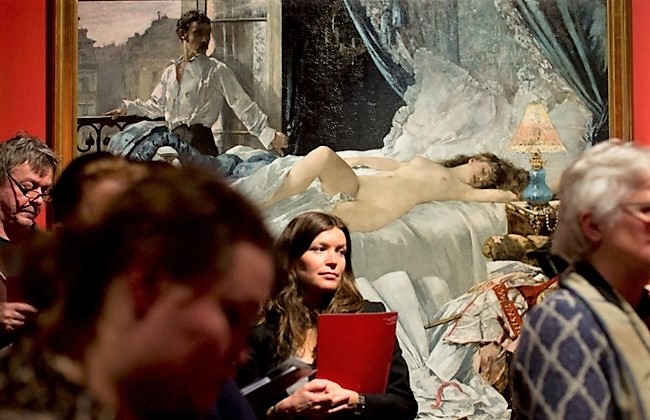National Geographic Channel described prostitution as the “Oldest Trade” and the “world’s oldest profession” but offered no ancient historical proof to support the claim. To investigate we have to turn to etymology and try to identity relevant bilaterals and mono syllabic root morphemes all of which appear to have been invented in the Stone Age. Assyrian and ancient Arabic are a good start but other ancient languages have to be consulted where necessary.
The target words would be any connected to “buy”, “sell”, “trade”, “exchange”, “slaves,” and words that could be the ancient equivalent to “prostitution’, “whoring” with deeper analysis of the usual words expressing “sex,” “love,” and private parts.
When we looked at the root of the word ‘tajr’ “trade” we identified *GR as the root origin. This is the origin of English car, cart, carry, carriage and caravan (from Arabic qairawan, an old city in Tunisia).
The root is part of a huge linguistic category but the most common meaning is “to pull, to drag”. Clearly, the very early traders had carts on which certain goods were moved from one populated area to another.
A carving in Saudi Arabia of a two-wheel cart pulled by a mule or a donkey is claimed to be 7,000 years old but as far as we know it was not carbon-dated. Other carving are found in Algerian rockart.
The root for ‘sell’ is *Bʻ vowelised to baʻ “sold” and ‘buyʻ ‘ “selling”. From the root is *Bʻr “camel dropping” and camels ‘*Bʻeer ‘. Clearly the oldest tradable commodity was camel dropping used as fuel for fire and for cleaning ancient dishes and pots because when dried it becomes close to natural scourers.
The root for “buy” is *ŠR (Š = ‘sh’) and ‘*ŠRa’ is “buying”. This is also a category the most common meaning of which is “pour, dribble, and seep”. So it looks the commodity people wanted most was water. Barter or trade exchange is “badl”. The root is *DL. From it is ‘dallal’ “an estate agent” but it applies to any trader who markets merchandise by showing it (literary indicating) to people. From it is English dalliance.
Clearly, National Geographic and all those who support the notion that prostitution is the oldest profession are supporting a myth.
But what is the etymological truth?
Time scale: If we assume the first bilaterals and mono syllabic root morphemes were invented 50,000 years ago, trilaterals were needed in the first third of the Agrarian Era because this most important transformation needed a fresh stock of words to express the multiple activities involved in agriculture and the trade that expanded because of plentiful harvests.
It is possible bilaterals expressing some sort of prostitution are lost but the words that remain are all trilaterals, or 5,000-6,000 years old.
The root for sex is *NK. From it is *NKḥ. This word is in Arabic and it means both sex and marriage. So no prostitution here.
The root for love is *ḤB. From it is Ṣ*ḤB (Ṣ =’s’ in ‘sub’). In today’s Arabic ‘Ṣa*ḤBa’ means “a girl friend” and sometimes “female lover”.
This trilateral is telling us that societies 7,000 years ago or more approved of the concept of “boy friend” and “girl friend”. In certain societies certain women specialized in introducing boys and girls to each other. The name of such a woman is ‘Qa*ḤBa’. The implication here is that the aim was to get them to love each other (because the root is ‘to love’).
Interestingly, this tradition continues to this day in most of the Arab and oriental societies but women undertaking this task are called “khattaba” literary “engagementer”. This is done usually free of charge as it is believed God will reward them for bringing boys and girls together.
However, the same word (‘Qa*ḤBa’) is used to denote a female “pimp” in both modern Arabic and Maltese.
The word in Arabic for prostitution is ‘Zna’. Connected to it is ‘zanb’ “sin”. For a long time prior to Islam, owners of slave girls used to send them out for prostitution but it was banned by Islam.
The root appears to be *ZN which could mean “persistence”, so there was a market for prostitution but the woman had to hard sell men into it.
For etymology the question, then: why wasn’t prostitution the oldest trade?
Two main reasons:
1- Only the lucky ones found an oasis in southern and eastern Arabia that provided water and food. The rest had to keep moving in search of both. In groups of no more than 100 people, most of our ancestors were on the move. When two groups met they exchanged goods, news and looked for wives and husbands for girls and boys who don’t have partners. Girls were a major concern for parents so special treatment was accorded to girls moving to join other groups. The father of her groom she calls “uncle” and she’s called ‘kinnah’ with meanings similar to the English “kin”. Her children will be known by the surname of her husband. It is claimed the English word is of Indo-European origin but it is from the linguistic cluster *KN/*NK, a comprehensive and crucial linguistic category of sex, children, relations and home. If you think that a group of 100 people is not significant you may want to know that the entire population of the world today are the children of a group 250-600 people strong. Nature wouldn’t have supported a larger number and less than 250 is not sufficient to survive let alone thrive due to natural death, sickness, dangers and women unable to have children. One study of ancient communities suggested the average age of people in those very old days was 12 years mainly due to very high rate of mortality amongst babies and children. ‘Meat’ is “hundred.
Those were tightly-net communities, mostly related, and usually descendants of one grandfather and one grandmother. Actually, the entire Ariba (ancient Arabs) and Arabs are mostly descendants of two parents, ‘Ud’ and ‘Ad’ and both were probably related.
2- Inheritance: Children will inherit from their parents and grandparents. Children born out of wedlock are not included. How do we know this? Because the root (*ʼR), for sex and private parts, is the same root for “inheritance” (*ʼRth). We also believe the hamza (ʼ a very short ‘a’) is convertible to ‘ayn’ producing ‘urs’ “wedding”.
Conclusion: Contrary to wide spread myths, ancient societies were as conservative as you can get. We are in the third millennium but we have not changed much, so you may not want to ask why nations in the longest cultural stretch in the world, from Morocco to Afghanistan, are conservative to this day.
Conservatism worked for them and they thrived.
The word for prostitution in Akkadian is ḫarmūtu but it appears it means nothing more than a ‘hole” (ḫar) so a prostitute is “a hole for rent”.
This is also an etymology post by old Adel Bishtawi.
Image credit: The Daily Star
Last modified: August 27, 2017



